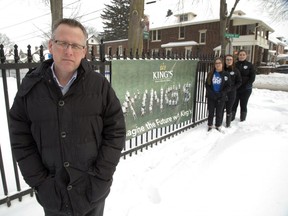London Transit braces for backlash against route changes

Article content
It’s push-back the likes of which hasn’t been seen in decades at the London Transit Commission.
Londoners objecting to increased bus service in their neighbourhood are expected to show up at its board meeting Wednesday in numbers not seen in 20 years.
At issue is a sweeping set of changes – the final instalment in a broader five-year strategy intended to increase and expand transit service in the city, straightening out some winding routes, adding new ones, and deleting others – that have fired up residents along the new and expanded bus paths.
Dozens of route changes are being recommended to the transit commission Wednesday, but the opposition is to a few in the north end of the city.
“We’ve never really encountered this before,” London Transit Commission (LTC) general manager Kelly Paleczny said of the large volume of presentation requests. Nine people are scheduled to speak to the transit commission.
“The majority are around one specific area that just doesn’t want transit in their area. One of our goals, and one of the goals of the city’s transportation master plan, is to get more Londoners within walking distance for transit. The only way you can do that is to put transit on corridors where it isn’t right now,” she said.
An Old North contingent is one of the most vocal opponents, claiming a plan to move Route 1 from Richmond Street to Colborne Street, and run other routes every 15 minutes down smaller streets such as Regent Street would increase congestion, pose safety challenges and negatively impact property values.
“It’s poor planning,” said Cate Grainger, who lives near the route changes, adding “the established neighbourhood of Old North” should be preserved.
She argued the frequent buses – every 15 minutes amounts to more than 100 buses a day – would slow or block traffic. Transit service would interfere with lawn maintenance and snow removal companies that park on the street to serve customers in the neighbourhood, Grainger said, and make it unsafe for children to walk to and from area schools.
“This is a neighbourhood where kids walk home for lunch, because there’s a parent at home,” she said, pointing to worries for parents of younger children.
LTC buses already travel on a portion of Regent Street, but the changes would bring many more buses.
And the dean of students at King’s University College is raising the alarm about losing a bus stop for Route 1 at Huron and Waterloo streets, saying the move may dissuade some students and staff from taking transit to the school.
Joe Henry called the current Route 1 stop at Huron and Waterloo “a gateway to our campus.”
“That stop will then be further east and south, and will encourage people not to take transit,” he said. “We have almost 4,000 people who come to school here or work here everyday. It’s a big constituency.”
Other bus routes would continue to stop at that intersection.
Paleczny said some of the service changes planned for 2019 are complex, with one switch dependent on another to fill in gaps and avoid overlap.
That’s the case for Western University, where the student council raised concerns about changes to routes that serve campus from the Masonville area. However, the reduction in service based on one route will be replaced by an express route that will operate more frequently and start earlier in the day, Paleczny said.
But even expanded bus service, starting earlier in the day and extending later into the night, have angered some residents.
Sandy Levin, a former city councillor and transit commissioner, represents a neighbourhood group that’s concerned changes to Routes 9 and 31 running on residential streets near Fanshawe Park Road and Wonderland Road.
“When I sent out a survey – there are 450 people on our community email list – nobody said they were cool with a seven-day service going up until 11:30 or midnight,” he said.
The LTC has to design routes that balance needs for Londoners, and that can create challenges, Paleczny said.
“Public transit is public by its nature, but it’s also very personal. Everybody’s trip is personal. As soon as you mess with that, that’s personal, because now you’ve messed with my trip,” she said. “That’s all part of what we have to try to balance.”
In October, the previous commission approved the draft plan and directed LTC staff to finalize the 2019 changes. The transit commission is expected to vote on the proposed route changes at its Wednesday meeting at LTC headquarters.
Paleczny said the last time there was such a swell of opposition to route changes was two decades ago when bus routes were expanded to a new neighbourhood. Public delegations are extremely rare at commission meetings.
THE CHANGES: LTC 2019 Service Plan
- 18,000 additional service hours on transit routes across London
- Final year of a five-year plan
- Most changes take effect Sept. 1, 2019
- Adds three new routes (Routes 56, 93, 94)
- Eliminates two routes (Routes 26 and 32)
- Ten public feedback sessions were held to gather feedback
- 1,150 online surveys completed on proposed changes, 138 emails and phone calls received






Postmedia is committed to maintaining a lively but civil forum for discussion. Please keep comments relevant and respectful. Comments may take up to an hour to appear on the site. You will receive an email if there is a reply to your comment, an update to a thread you follow or if a user you follow comments. Visit our Community Guidelines for more information.